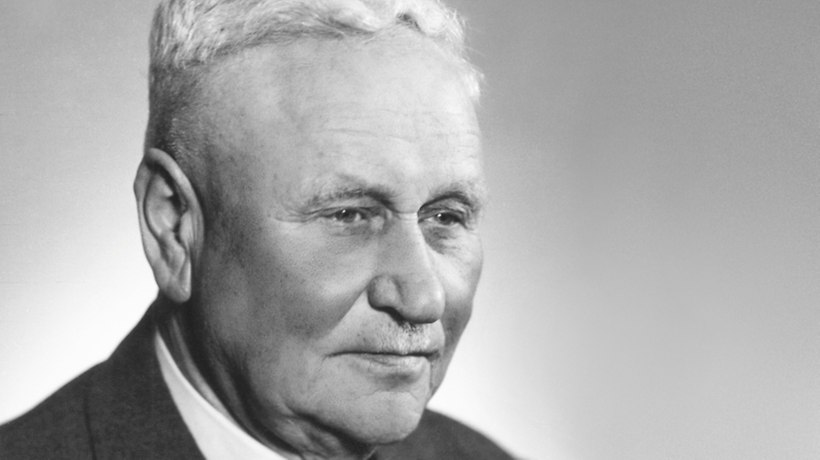

Bernhard was the oldest of the Claas brothers. In the 1920s, the fledgling company needed someone like him, someone who had the necessary composure and life experience to retain a general overview, and bring in his own farming expertise and extensive general knowledge.
He was born in 1885 on his parents’ farm in Clarholz-Heerde, a neighbouring town to Harsewinkel, and was the first person in the family to be conscripted. In the army, he soon acquired a reputation for being an expert on agricultural machinery. On the battlegrounds of northern France in World War I, he was assigned to a unit commissioned with ensuring that French farmers’ agricultural machinery and traction engines were repaired in time for the coming harvest.
Specifically, he worked in a small factory looking after technology for threshing machines, towing vehicles and later milk centrifuges – all familiar territory to him. A background in both farming and technology was certainly a key influencing factor in the way that Bernhard Claas was deployed during the war. His involvement in these areas during the war may also have been crucial for the development of CLAAS over subsequent decades.
Without realising it, Bernhard Claas took a crucial step in setting the course for the later expansion of the company: his superior officer in the army was Karl Vormfelde who, as head quartermaster, was put in charge of all the agricultural machinery factories in occupied France.
Vormfelde came from eastern Westphalia, near the town of Enger. After the war, when Karl Vormfelde held the chair for agricultural technology at Bonn University, Bernhard Claas learned of his whereabouts from a newspaper article. He wrote a friendly note to Vormfelde, asking if he remembered him. The professor did indeed, and contact was quickly reestablished. In collaboration with CLAAS, Karl Vormfelde developed the first European combine harvester and always remained a intimate associate and friend of the company. Today, in professional circles, he is considered the pioneer of the European combine harvester. At the time, however, he was just a lone voice in the wilderness.
Bernhard was involved in all the key decisions taken by the company, but without pushing himself into the spotlight. People liked his calm, relaxed nature and the sensible advice he gave. This was also one reason he got on so well with his brothers.
Bernhard Claas enjoyed the quiet life he led in his small building opposite the porter’s lodge at the main entrance to the CLAAS plant in Harsewinkel, and he liked the close contacts that he and his wife Käthe enjoyed with the neighbours, in particular with his close friend, building contractor Josef Heitmann.
The CLAAS employees liked him. Even though he had no job description to tie him to an everyday routine, he looked after “his factory” and “his people”. He was on the premises every day, and was totally familiar with every operating procedure. He acted as an unofficial employee representative, exercising a monitoring function, but without upsetting those being monitored. He was said to possess keen powers of observation. He noticed defects and inefficiencies, and remedied them without any fuss, sometimes without saying anything, and always in a socially acceptable manner. He made improvements to the company, yet without turning it upside down. He was satisfied simply by seeing the change made promptly.
He never said in so many words that he was only interested in things that could benefit the company, but that was how he operated in practice. His biggest contribution as a team player came in 1935. Since he had no children of his own, he transferred his shares in the company to his brother Theo: “Theo has not been a partner up to now. Now that he has a family, Käthe and I agree that I should resign my partnership and give my share to Theo. Our factory has grown so big that we need to think about the future.” Bernhard was given an employment contract with double the salary of a foreman, and retained the right to live on the floor above what was then the business office. Bernhard Claas died on 18 February 1955, in Bielefeld.







